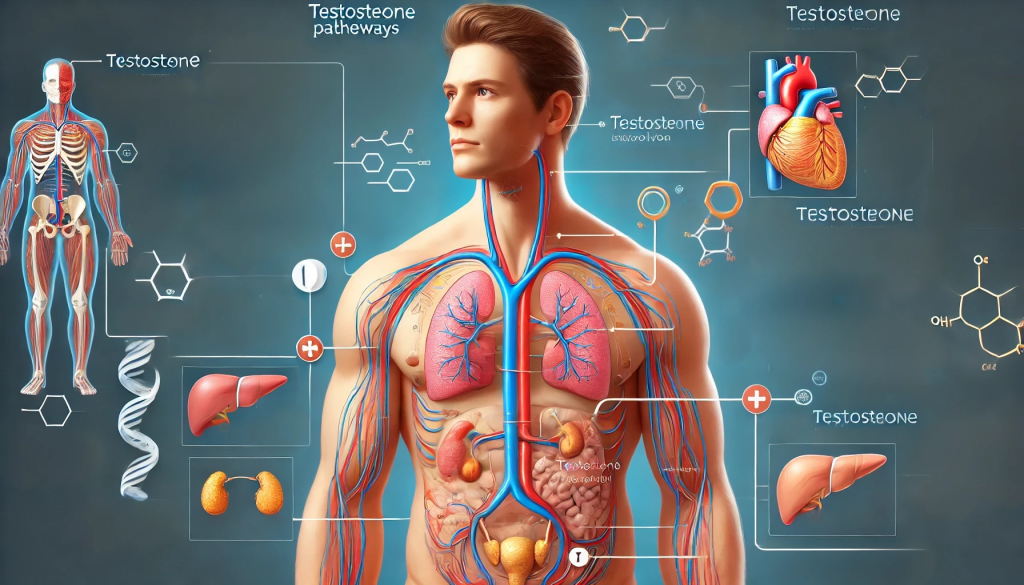Testosterone is a key hormone that affects men’s health. Its decline can lead to fatigue, reduced libido, and poor overall health. Here are the top 10 ways to boost testosterone naturally.
1. Regular Physical Activity

- High-intensity interval training or weightlifting can boost testosterone levels.
- Strength training for major muscle groups is particularly effective.
2. Proper Nutrition
- Consume foods rich in proteins, fats, and carbohydrates to maintain hormonal balance.
- Zinc-rich foods (seafood, nuts) and magnesium (greens, seeds) support testosterone production.
3. Weight Management
- Excess body fat lowers testosterone levels.
- Reducing body fat percentage helps normalize hormonal levels.
4. Quality Sleep
- Aim for 7-8 hours of sleep. Sleep deprivation can lower testosterone by 10-15%.
5. Stress Reduction
- Cortisol, produced during stress, suppresses testosterone.
- Practice meditation, yoga, or breathing exercises.
6. Supplements and Vitamins

- Vitamin D and zinc supplements can help increase testosterone levels.
- Fish oil and B vitamins are also beneficial.
7. Limit Alcohol Consumption
- Alcohol disrupts hormonal balance, reducing testosterone levels.
8. Regular Sexual Activity
- Active intimacy helps maintain high testosterone levels.
9. Avoid Toxins
- Avoid plastic containers and chemicals that contain estrogenic substances.
10. Consume Natural Aphrodisiacs

- Foods like avocado, pomegranate, and garlic help enhance testosterone production.
Conclusion
Following simple habits like physical activity, proper nutrition, and quality sleep can help maintain optimal testosterone levels. Regular health checkups and consulting a specialist are also essential.
The Importance of Testosterone: A Medical Perspective
Testosterone is a vital hormone that plays an indispensable role in the human body, influencing numerous physiological processes and maintaining overall health. Produced primarily in the testes in males and, to a lesser extent, in the ovaries and adrenal glands in females, testosterone is often associated with male characteristics. However, its significance transcends gender, with both men and women relying on optimal levels of this hormone for physical and mental well-being.
Testosterone is a steroid hormone belonging to the androgen group, responsible for the development of secondary sexual characteristics in males, such as increased muscle mass, body hair growth, and a deeper voice. During puberty, testosterone surges, driving the transformation from boyhood to manhood. Beyond sexual development, this hormone is critical for numerous other functions, including the maintenance of bone density, muscle strength, fat distribution, and the production of red blood cells.
In males, testosterone is essential for spermatogenesis, the process of sperm production. Low levels of testosterone can lead to reduced fertility, decreased libido, and erectile dysfunction. These issues not only affect physical health but also have profound psychological and emotional impacts. In women, although present in much smaller quantities, testosterone is crucial for bone health, energy levels, and sexual drive. Low testosterone in women can lead to decreased muscle mass, fatigue, and diminished sexual satisfaction, underscoring its importance for female health as well.
The hormone’s influence on mental health is another area of significant interest. Testosterone levels are linked to mood regulation, with low levels often associated with symptoms of depression, irritability, and cognitive decline. Conversely, excessively high levels can lead to aggression and risk-taking behaviors. This balance highlights the complexity of testosterone’s role in neuropsychological processes.
A fascinating aspect of testosterone is its diurnal rhythm. Levels are highest in the early morning and gradually decline throughout the day. This natural fluctuation underscores the importance of timing when assessing testosterone levels through blood tests, typically recommended in the morning. Age also plays a significant role in testosterone dynamics. After the age of 30, testosterone levels begin to decline in men, a phenomenon known as andropause. This age-related decline can contribute to symptoms such as reduced energy, loss of muscle mass, increased body fat, and decreased libido.
Lifestyle factors also profoundly affect testosterone production. Regular exercise, particularly resistance and high-intensity interval training, has been shown to boost testosterone levels. On the other hand, sedentary behavior, obesity, chronic stress, and inadequate sleep can lead to reduced levels. This interplay between lifestyle and hormone production highlights the importance of holistic health approaches in maintaining optimal testosterone levels.
Another intriguing area of research involves testosterone’s role in cardiovascular health. While traditionally believed to increase the risk of cardiovascular disease, recent studies suggest that low testosterone levels may actually be associated with a higher risk of heart disease and metabolic syndrome. Testosterone replacement therapy (TRT) in men with clinically low levels is an area of active investigation, aiming to improve quality of life and potentially reduce cardiovascular risks. However, TRT is not without controversy, as improper use or over-replacement can lead to adverse effects such as polycythemia, prostate enlargement, or even malignancy.
Testosterone also has significant implications in metabolic health. It influences the regulation of insulin and glucose metabolism, which are critical in the prevention of diabetes. Men with low testosterone levels are more likely to develop type 2 diabetes, further emphasizing the hormone’s role in maintaining metabolic balance. For women with conditions like polycystic ovary syndrome (PCOS), elevated testosterone levels can contribute to insulin resistance, weight gain, and hirsutism, illustrating how imbalances can lead to distinct health challenges across genders.
The relationship between testosterone and physical performance is widely recognized. It is a key driver of muscle protein synthesis, enabling muscle growth and repair after exercise. Athletes and bodybuilders often misuse anabolic steroids, synthetic derivatives of testosterone, to enhance performance and appearance. However, this practice comes with significant health risks, including liver damage, cardiovascular disease, and psychological disturbances.
Diet and nutrition play an integral role in testosterone production. Nutrients like zinc and vitamin D are critical for maintaining healthy levels. Zinc deficiency, for instance, has been linked to hypogonadism and reduced testosterone production. Similarly, vitamin D, which is synthesized in the skin through sun exposure, is positively associated with testosterone levels. A balanced diet rich in lean proteins, healthy fats, and micronutrients is essential for supporting the body’s natural hormonal balance.
In the context of sexual health, testosterone’s importance cannot be overstated. It is central to libido and sexual performance in both men and women. Low testosterone levels can lead to a diminished interest in sexual activity and a reduced ability to achieve sexual satisfaction. Addressing such issues often involves a combination of lifestyle modifications, hormone replacement therapy, and psychological support.
While testosterone is often associated with male health, its systemic effects on the human body highlight its universal importance. From bone density to mood regulation, cardiovascular health to sexual well-being, testosterone serves as a cornerstone of physical and mental health. Understanding its multifaceted roles allows for better management of conditions associated with hormonal imbalances, ensuring a higher quality of life for individuals affected by these issues.
In conclusion, testosterone is far more than a “male hormone.” Its pervasive influence on the body makes it a critical component of health for everyone. Advances in medical research continue to shed light on its complex roles, offering hope for targeted therapies and interventions. By appreciating the intricate balance required to maintain healthy testosterone levels, both men and women can take proactive steps to support their overall health and well-being.
















